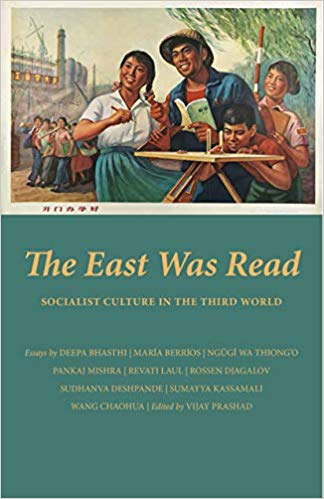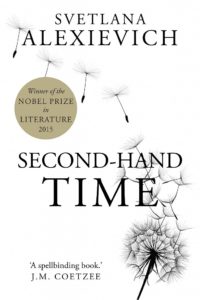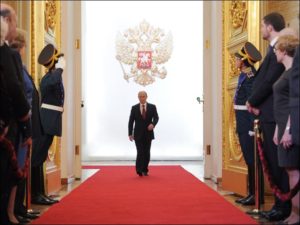“The East Was Read: Socialist Culture in the Third World”
The East Was Read is an anthology of essays on the impacts of socialist culture in various parts of the Third World. Wang Chaohua and Pankaj Mishra recall with fondness the meaning of these books for their very different lives in China and in India respectively. Deepa Bhasthi goes on an emotional journey into the library of her grandfather, a communist intellectual. Rossen Djagalov writes a short history of Progress Publishers. Ngugi Wa Thiong’o talks about how he wrote Petals Of Blood in Yalta on the sidelines of the Afro-Asian Writers’ Association in 1973. Sumayya Kassamali writes about Faiz in Beirut, giving us a sense of the cultural worlds that drew in both the Soviet Union and the Third World Project. Across the Third World, people grew up reading inexpensive beautifully-produced books from the Soviet Union — children’s books, classics of world literature, books on science and mathematics, works of Marxist theory. One such prominent publisher responsible for producing beautiful books, many in translation, was Progress Publishers. The following extracts from the essay have been reproduced with the permission of the publisher.
****

(p. 78)
As an heir to the nineteenth-century Russian intelligentsia’s literature-centrism, the Soviet state, down to its very bureaucracy, believed in literature’s capacity to change society and made an enormous investment in literacy campaigns and the wide accessibility of literature through publishing houses, bookstores, libraries, and public readings. As a testimony to that belief, by the time the USSR ceased to exist, its Writers’ Union had approximately 10,000 members, that is, 10,000 professional writers who could live off their literary work—a number probably never matched in history, before or after. It was not only a matter of financing: through street names and monuments, school curricula and press reports about writers, the state helped to institutionalize the idea of the intelligentsia as the spokesperson of the people. It also helped to cement the idea that literature is an authoritative source of values. And yet from the second half of the 1920s onward, Stalinism also did much to compromise that ideal by increasingly using literature instrumentally, censoring it to better reflect its talking points, and otherwise controlling it.
…
(p. 81 – 83)
Progress’s origins could be found in the utopian visions of the immediate post-Revolutionary period. In the realm of literature, one of the main generators of these was Maxim Gorky, who proposed a World Literature publishing house that would translate all foreign literatures into Russian, Russian literature into all the major languages of the world, and finally, all of the above in to the languages of the Soviet Union. An economically devastated and politically isolated Civil War era Russia, however, was not a place where such visions could be realized. A World Literature publishing house did appear between 1919 and 1924, focused only on one part of Gorky’s vision: the translation of world classics into Russian. While it offered much-needed employment to Petersburg writers as translators and editors, paper shortages, organizational difficulties, and lack of funding ultimately meant that most of their translations remained unpublished.[1]
With time, however, the resources at the disposal of the Soviet state grew and elements of these early visions began to be realized even if compromised to one degree or another by the growing Stalinist stratification. Founded in 1931, a Moscow-based literary magazine with issues in several languages, Literature of the World Revolution (renamed in the beginning of the Popular Front period to International Literature) may have been the most visible structure of Soviet literary internationalism. Yet more significant, especially as far as non-Soviet readers were concerned, was the establishment that same year in Moscow of the Publishing Cooperative of Foreign Workers (ITIR), Progress’s predecessor, which translated books into foreign languages.[2]By that time, there were already several other foreign-language newspapers in the city: the Polish Tribuna Radzecka, the French Journal de Moscou, the English Moscow News as well as The Communist International, which was publishing issues in German, English, French, Spanish, and Chinese. Besides, the Executive Committee of the Communist International (ECCE) was already translating and printing the works of Lenin and other political literature in different languages.[3]
ITIR drew its translators and editors from both polyglot Soviet citizens with foreign experience and political refugees, often with Comintern connections. Indeed, its staff reflected the composition of Moscow’s foreign community and its shifts: from the influx of Spanish refugees in the late 1930s to their retirement or departures for Mexico, Cuba, or Spain in the 1960s and ’70s, from the return of the Moscow-based East European exiles to their countries in themid-1940s to the increasing numbers of non-Western subjects in post-Stalin-era Moscow such as the main translator of nineteenth-century Russian literature in Hindi—Madan Lal Madhu (1925–2014).
…
(p. 83 – 84)
In the history of publishing, there has probably never been a press so linguistically ambitious. In its first year (1931), it published in 10 West European (English, German, French, Italian, Dutch, Swedish, Norwegian, Danish, Spanish, and Portuguese), seven East European (Serbo-Croatian, Czech, Bulgarian, Romanian, Hungarian, Polish, and Lithuanian), and five Asian languages(Japanese, Chinese, Korean, Persian, and Turkish). And while the first post-Second World War decade saw the emergence of an Afro-Arab (Arabic, Amhara, Yoruba, Hausa, Swahili) and Indian (Hindi, Urdu, Bengali, Tamil, and Telugu) sections, it was in the post-Stalin era that non-Western languages came to dominate the overall publishing plans. Over the course of the1960s alone, the number of ‘Eastern’ languages doubled, from15 to 28. By 1980, the Indian section was producing more titles than the English one, which had led the publishing house since its foundation. (Throughout this period, books in the colonial languages—English, French, Spanish, and Portuguese—were also being sent to Africa, Asia, and Latin America by ITIR’s distributor, Mezhkniga.) By the time it came to an end in 1991, Progress was a behemoth publishing yearly close to 2,000 new titles with a print run approaching 30 million copies.[4]
…
(p. 85-86)
It was publishing in foreign languages, however, that accounted
for the vast majority of Progress’s output. Many around the world fondly remember
Progress’s cheap, high quality editions of otherwise unavailable Marxist literature.
In addition to the classics of Marxism and Leninism, the other three areas Progress
published in were politics, textbooks & illustrated materials, and fiction.
Fiction emerged as a distinct field of the publishing house only gradually, as the
classics of Marxism-Leninism and contemporary political studies had initially been
the main focus of ITIR’s work. Over the course of the 1930s, however, some of the
publishing house’s more distinguished translators such as Alice Oran, George Rui,
Maximilian Schick, Hilda Angarova, Jose Vento, Angel Errais, Margaret Amrome, Ivy
Litvinova (Soviet foreign minister Maxim Litvinov’s wife) began to translate the
classics of Russian and early Soviet literature into foreign languages. Slowly,
over the post-war era, the literature section became the largest of Progress’s four
thematic sections, reaching in 1981 a volume of 404 titles. The following year,
1982, it evolved into an independent publishing house, Raduga (Rainbow). By that
point, the editorial choices for texts to be translated could easily veer away from
the safe classics to include more debatable contemporary Soviet literature such
as Valentin Rasputin and Chinghiz Aitmatov’s novels. There has never been another
publishing house worldwide that could compete with its ability to popularize Russian
and Soviet literature abroad, or more generally, any publishing attempt of such
scale to create a direct translation link between two non-Western literatures, bypassing
the monopolies of London, Paris and New York. And yet, together with all other Soviet
projects for world literature, this one has been largely forgotten, except maybe
for the occasional volume in public libraries and private collections.
[1]Maria Khotimsky, ‘World Literature, Soviet Style: A Forgotten Episode in the History of the Idea’, Ab Imperio, vol. 2013, no. 3, 2013, pp. 119–154.
[2]Petr Petrov, Kistoriiizdatel’stva ‘Progress’, Moscow: Progress Publishers,1987.
[3]For more on Moscow’s cosmopolitanism of the 1930s, see Katerina Clark, Moscow, the Fourth Rome: Stalinism, Cosmopolitanism, and the Evolution of Soviet Culture, 1931-1941, Cambridge, MA: Harvard University Press, 2011.
[4]Ibid., pp. 67, 108.
28 May 2019



